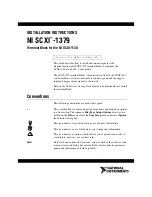
4. Configuration
177
As described above, the total cycle time is the result of those parts: Inputs Reading, Outputs writing
and User application execution. Thus, the application runtime is affected by the amount of bus
input/output modules. The length of the I/O update part is approximately 1 ms for each 20 modules
integrated into the project. The last MainTask step (waiting to complete the set range) is the stage
where the communication drivers and all other low-priority services run.
Additionally, it is possible to configure the RTU to perform the update of modules inputs and outputs
by using the option called “Enable I/O update per task”, located at the CPU configurations. When
this option is enabled, the CPU performs an access to the local bus on the context of each task for
updating the inputs and outputs that are being used on that task. This option can be very useful in
cases that ProtTask is used and it is necessary to have a fast response of inputs and outputs
(protection logics for example). The sequence of the actions is slightly different than the MainTask,
as it is described below:
User application execution
Outputs Writing
Inputs Reading
Wait to complete the interval set for the MainTask
ATTENTION:
Even if an I/O point is used and updated in other tasks, with the option
Enable I/O update per task
, it
will continue to be updated in MainTask too; except when all the module's I//O points are used and
updated in another task, in this case will no longer be updated by MainTask.
Memory Card
Data transference involving the memory card is performed by the CPU in the background, as this
gives priority to the execution of user application and communication processing. Thus, the files
transfer to the card may suffer an additional significant time, depending on the Cycle Time of the
user application. The time required to read/write files on the card will be directly affected by the
Cycle Time of the user application since this application has priority in execution.
Further information on memory card, see Configuration - Memory Card.
RTC Clock
Hadron Xtorm Series CPUs have an internal clock that can be used through the LibPlcStandard.lib.
This library is automatically loaded during the creation of a new project (to add libraries, see
Libraries). Figure 4-51 shows how to include the available blocks/function blocks to access the clock.















































